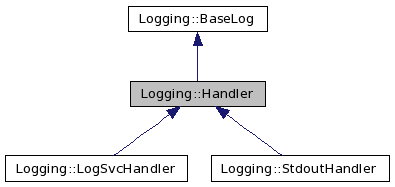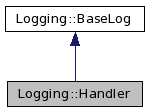#include <loggingHandler.h>


Public Types | |
| typedef Loki::SmartPtr < Handler, Loki::RefCountedMTAdj < Loki::ObjectLevelLockable > ::RefCountedMT, Loki::AllowConversion, Loki::NoCheck, Loki::DefaultSPStorage > | HandlerSmartPtr |
| Handler smart pointer. | |
Public Member Functions | |
| virtual | ~Handler () |
| Priority | getLevel () const |
| void | setLevel (Priority priority) |
| virtual void | setLevels (Priority remotePriority, Priority localPriority, int type) |
| int | getRemoteLevel () |
| int | getLocalLevel () |
| void | setRemoteLevel (Priority remotePriority) |
| void | setLocalLevel (Priority localPriority) |
| void | setRemoteLevelType (int type) |
| void | setLocalLevelType (int type) |
| int | getRemoteLevelType () |
| int | getLocalLevelType () |
Private Attributes | |
| Priority | priority_m |
| Priority | localPriority_m |
| int | priority_type_local_m |
| int | priority_type_remote_m |
| Priority | remotePriority_m |
Detailed Description
A Handler object takes log messages from a Logger and exports them. It might for example, write them to a console or write them to a file, or send them to a network logging service, or forward them to an OS log, or whatever. A Handler can filter out certain log messages by using the setLevel method. This class is abstract as the developer must implement the log and getName methods inherited from BaseLog.
Member Typedef Documentation
| typedef Loki::SmartPtr<Handler, Loki::RefCountedMTAdj<Loki::ObjectLevelLockable>::RefCountedMT, Loki::AllowConversion, Loki::NoCheck, Loki::DefaultSPStorage> Logging::Handler::HandlerSmartPtr |
Handler smart pointer.
Constructor & Destructor Documentation
| virtual Logging::Handler::~Handler | ( | ) | [virtual] |
Destructor
Member Function Documentation
| Priority Logging::Handler::getLevel | ( | ) | const [inline] |
Get the log level specifying which messages will be logged by this Handler. Message levels lower than this level will be discarded.
- Returns:
- Current log level for this Handler.
References priority_m.
| int Logging::Handler::getLocalLevel | ( | ) | [inline] |
References localPriority_m.
| int Logging::Handler::getLocalLevelType | ( | ) | [inline] |
References priority_type_local_m.
| int Logging::Handler::getRemoteLevel | ( | ) | [inline] |
References remotePriority_m.
| int Logging::Handler::getRemoteLevelType | ( | ) | [inline] |
References priority_type_remote_m.
| void Logging::Handler::setLevel | ( | Priority | priority | ) | [inline] |
By utilizing setLevel, one can filter out log messages entirely based on their priority. For example, calling setLevel(DEBUG) on a Handler would imply log messages with a lower priority such as TRACE would never be passed to the publish method.
- Parameters:
-
priority New priority for this Handler
- Returns:
- void
References priority_m.
Referenced by setLevels().
| virtual void Logging::Handler::setLevels | ( | Priority | remotePriority, | |
| Priority | localPriority, | |||
| int | type | |||
| ) | [inline, virtual] |
Set levels for local and remote logging. It depends on the handler implementation (does it support only loca/remote or both) to handle the level. Default implementation sets localPriority.
- See also:
- setLevel()
- Returns:
- void
Reimplemented in Logging::LogSvcHandler.
References setLevel().
| void Logging::Handler::setLocalLevel | ( | Priority | localPriority | ) | [inline] |
References localPriority_m.
| void Logging::Handler::setLocalLevelType | ( | int | type | ) | [inline] |
References priority_type_local_m.
| void Logging::Handler::setRemoteLevel | ( | Priority | remotePriority | ) | [inline] |
References remotePriority_m.
| void Logging::Handler::setRemoteLevelType | ( | int | type | ) | [inline] |
References priority_type_remote_m.
Member Data Documentation
Priority Logging::Handler::localPriority_m [private] |
Local (stdout) priority.
Referenced by getLocalLevel(), and setLocalLevel().
Priority Logging::Handler::priority_m [private] |
Current priority that needs to be met before log messages are
sent to the publish method.
Referenced by getLevel(), and setLevel().
int Logging::Handler::priority_type_local_m [private] |
Referenced by getLocalLevelType(), and setLocalLevelType().
int Logging::Handler::priority_type_remote_m [private] |
Referenced by getRemoteLevelType(), and setRemoteLevelType().
Priority Logging::Handler::remotePriority_m [private] |
Remote priority.
Referenced by getRemoteLevel(), and setRemoteLevel().
The documentation for this class was generated from the following file:
 1.7.0
1.7.0